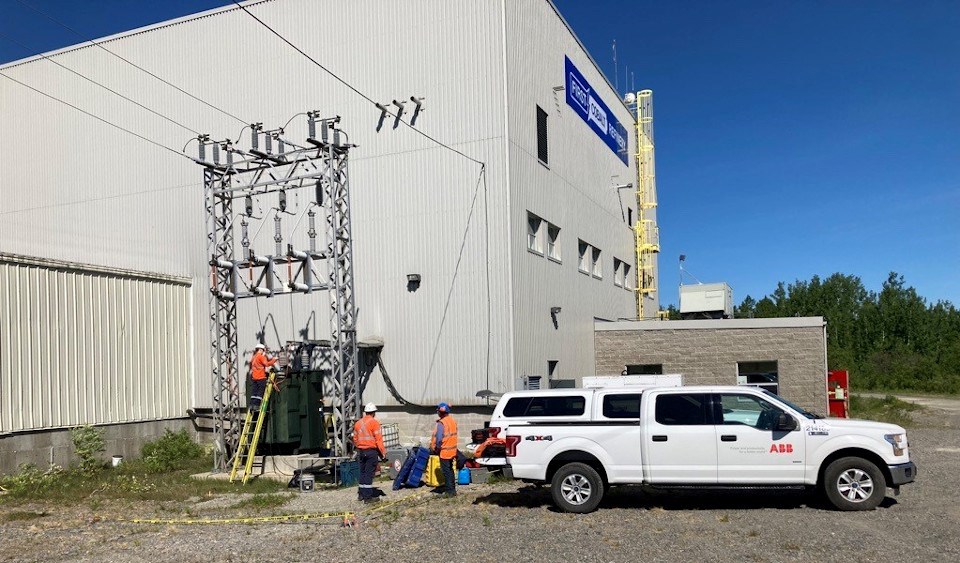The company refurbishing a mothballed metals refinery near the town of Cobalt are discussing the idea of creating a Battery Park, catering to the supply chain needs of the North American electric vehicle industry.
Toronto's First Cobalt wants to produce refined cobalt at the facility, along with a used battery recycling plant, but they're also strategizing to produce nickel sulfate on the same site, five kilometres outside of town, within the next few years.
Both nickel and cobalt are used in electric vehicle battery production.
For First Cobalt, this is a US$60-million expenditure to bring the former Yukon refinery back to life. The facility ran for about a decade - producing cobalt, nickel, copper, silver and other products - before being shuttered in 2015. First Cobalt acquired the shuttered building in 2017.
In a July 13 news release, the company said it's in early discussions with undisclosed government officials about creating a Battery Park on the property, something similar to the Harjavalta Industrial Park in Finland.
First Cobalt wants to attract a manufacturing partner to northeastern Ontario to deliver the final, value-added, chemical processing step prior to a battery being mechanically fitted within a cathode and anode casing for electric vehicles.The company thinks such an approach would provide "mutual advantages" in lower operating and logistics costs and a smaller environmental footprint.
Want to read more stories about business in the North? Subscribe to our newsletter.
This summer, contractors and technicians have arrived at the refinery working on the electrical and water intake systems in preparation for an October 2022 startup. That's when cobalt hydroxide feed arrives from the Democratic Republic of Congo through a supply agreement with Glencore and China Molybdenum Co.
When in operation, the facility will be the only refiner of battery-grade cobalt sulfate in North America and the second largest outside of China, where 80 per cent of the world's processed cobalt comes from.
In the news release, company president Trent Mell reminded all that this operation will be good for the North American battery supply chain as this is the first cobalt refinery to be built outside China in 20 years.
"Cobalt prices are up more than 20 per cent over the past four weeks and we are witnessing stronger interest in off-take contracts as the battery supply chain shifts its focus from Europe to new investments in North America," he said.
New equipment arrives later this year to boost the plant's processing capacity from 12 tonnes to 55 tonnes of per day of cobalt hydroxide feed, translating to 25,000 tonnes of battery-grade cobalt sulfate being produced annually.
A next phase of plant expansion is a recycling operation to recover the cobalt, nickel, copper and other valuable materials from spent lithium-ion batteries. Hydrometallurgical test work the company had done on 'black mass' samples showed high recoveries of both cobalt and nickel.
To finance the refinery upgrade, First Cobalt has $14 million in the treasury along with a combined $10 million in federal and provincial funding. The company is also going the commercial lending route to secure $45 million to finish the job.
"We continue to build the refinery expansion utilizing much of the existing physical asset," said Mark Trevisiol, the company's vice president of project development, in a statement. "The equipment and processes selected are designed around our feedstock using known chemical processing methods employed in various other refining operations around the world."
Sign up for the Sudbury Mining Solutions weekly newsletter here.
The refinery road has also been upgraded to receive heavy traffic of transport trucks.
First Cobalt has pocketed a government permit to take water and has filed two permit amendments for air/noise and industrial sewage works, along with a site closure plan.
The hiring process has already started to build the refinery's workforce. Recently hired from the community were a health, safety and logistics superintendent and a health, safety, environment and training coordinator. Additional people will be recruited in the coming months, the company said.




